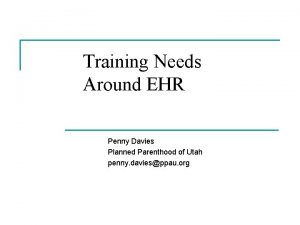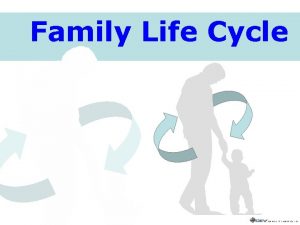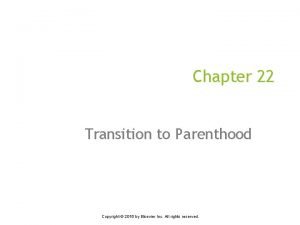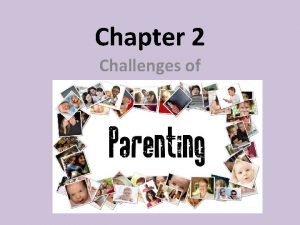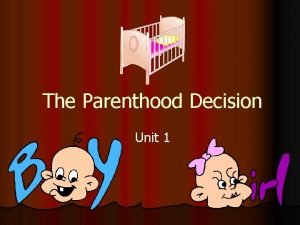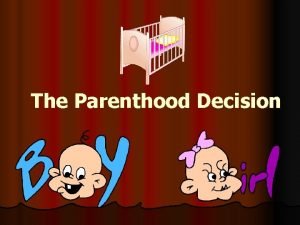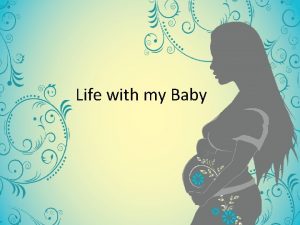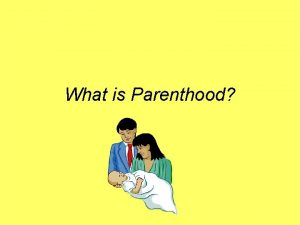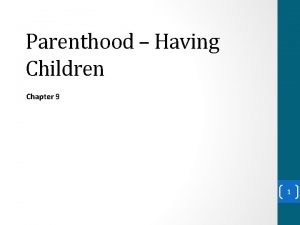WHAT PARENTHOOD MEANS Parenthood Many adults choose to









- Slides: 9

WHAT PARENTHOOD MEANS

Parenthood… • Many adults choose to expand their family group by having children. • This decision to do so should not be taken lightly!! • Can be very difficult to deal with if unprepared.

New Responsibilities • A lifelong commitment • Child needs physical care, financial support, love, guidance (continues until adulthood) • Constant concern for the welfare of another human being. • Good management is key to fulfilling these responsibilities.

To Be a Parent The quality of parenting is determined by an adult's knowledge and skills. Parenting is a mind-boggling task. They are responsible for the following needs: ·Physical - food, clothing, shelter, health care, exercise and rest, etc. ·Intellectual - good experiences to develop skills. ·Social - provide opportunities to be with other children. It helps them learn how to respond to others. Also, teach positive attitudes, moral standards. ·Trust - children need to feel that they can cope with the demands of family, friends, school and society. Trust begins early in life when parents meet the child's needs. It continues to grow when parents allow their children freedom to develop. ·Love/Discipline - parents must learn to listen to their children, set limits and share reasons for needed limits; support them and provide encouragement.

Parenthood. . . How does it affect lifestyle? ? ? ◦ Limits on personal freedom ◦ Strain on time and energy ◦ Difficulty in planning ahead ◦ Money problems ◦ Additional household chores ◦ Career decisions ◦ Emotional conflicts ◦ Additional space requirements

Emotional Adjustments: • Many changes in a short time leads to stress. • Takes time to sort through conflicting feelings and to get used to your new role as a parent. • Doubts about decision to become a parent • Worry about money • Jealousy (baby gets all the attention) • Anxiety about baby - how to care for him/her • Depression - exhaustion or physical changes of pregnancy/birth • Fear of not being a good parent • Adjustments best handled by parents who • Frustration - loss of personal freedom and are prepared and who understand this is normal new responsibilities • Loneliness / isolation - spend most time at home

Changes in Relationships: • Some new parents feel overwhelmed with negative emotions and bicker with each other; puts strain on relationship; the need for more money and space adds to the problem. • May lose old friends (nothing in common anymore) • Extended family members get involved (could be positive or negative-may resent the suggestions). • May bring parents closer to their own parents. • Older children may resent new baby • Patience, planning, be prepared are key. • Changes also happen at work as well.

Good Reasons: ◦ "Having children will add depth to our already strong relationship. " ◦ "I want to give a baby my care and love. " ◦ "I want to experience the special bond between parent and child that lasts for a lifetime. " ◦ "I love children and I sincerely want to be a parent. "

Questions to work on for the week: 1. Which of the changes caused by parenting do you think is the biggest? Why? 2. How can parents-to-be prepare for changes brought on by parenthood? 3. Thinking of what is going on in the world, have you heard of ways that businesses and corporations are helping their employees with kids? 4. If you answered no, how do you think businesses and corporations should be flexible towards their employees with children, especially smaller children. 5. How do you think Covid-19 is effecting families and their children? Give three examples. Journal #5: List 7 -10 questions that you think someone should ask themselves before deciding to become a parent


